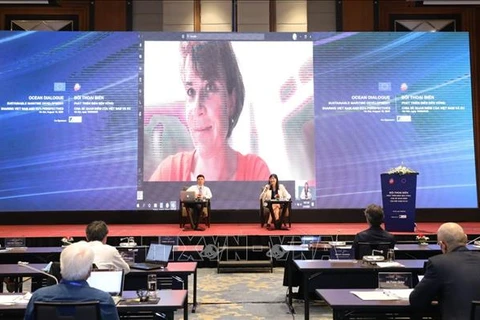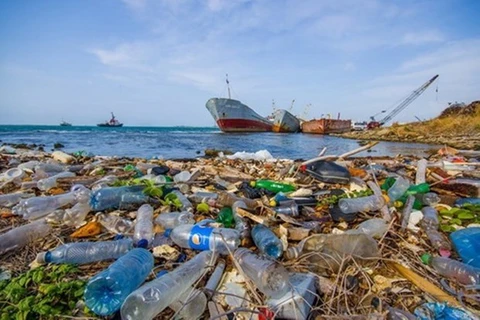HCM City (VNS/VNA) - Vietnam and the European Union (EU) should work together to accelerate the transition towards “a carbon-neutral, resource-efficient and circular economy” to tackle climate change, the European Commissioner for the Environment, Oceans and Fisheries has said.
Speaking at the recent Green Economy Forum & Exhibition, Virginijus Sinkevičius said: “We need global action – at all levels and within this decade – for a world that is climate-neutral, nature-positive and resilient.
“We need to pick up the pace. Time is running out. Today is a great opportunity for direct engagement among EU and Vietnamese stakeholders on the green transition agenda,” he said.
The EU is aware of the need for global change as no one country can advance a sustainability agenda on its own, he said.
The EU and Vietnam are already key partners with the latter emerging as one of the former’s main partners in Southeast Asia, he said.
Both sides are working together very closely on major issues such as the circular economy and plastics, and forests and deforestation through the voluntary partnership agreement and others, he said.
“We also face common challenges, but these challenges should help us forge an even closer relationship in the years to come.”
“The world faces a triple crisis – climate change, biodiversity loss and pollution – and each of them reinforces the others, and we need to tackle them together,” he said.
“The world is now burning through its natural resources at an unsustainable rate. We take, we use, we throw away. We need a different approach, one that keeps resources in the economy for much longer, and makes waste a thing of the past.”
Actions
To deal with the crisis, in 2019 the EU developed the European Green Deal to address these issues, including policies and laws to cut pollution and preserve bio-diversity.
Most of its elements are now in place.
The EU now has a Climate Law, which mandates a 55% reduction in emissions by 2030 and climate neutrality by the middle of the century.
The EU has also proposed an economic model called circular economy which seeks to reduce the consumption footprint and double the rate at which resources are reused before the end of this decade.
Alain Cany, Chairman of the European Chambers of Commerce Vietnam (EuroCham Vietnam), said: “Vietnam can achieve a robust green transition only through a whole-of-society transformation that reimagines how people live and how economic development is approached.”
He said that to accomplish this, the European and Vietnamese governments, the private sector and the public sector should work together.
“Without doing this completely and immediately, we will most certainly fail.”
Speaking at the event, Prime Minister Pham Minh Chinh said climate change is a global issue requiring international cooperation to make a significant impact since “no country can fix the problem on its own”.
“All solutions to global warming require global cooperation, and people must be a central pillar of any successful climate change strategy.”
Vietnam as one of the countries most affected by climate change has approved a green development strategy to combat climate change. It is also committed to cutting net emissions down to zero by 2050.
It has also developed a master plan to switch from fossil fuels to renewable energy and reduce greenhouse gas emissions in all fields, he said.
He hoped the EU and its financial institutions would continue to support Vietnam’s development of advanced technology, green capital and human resource training.
Organised by EuroCham Vietnam, the Green Economy Forum & Exhibition held from November 28 to 30 was attended by 2,800 delegates.
There were over 30 conferences and panel discussions attended by 150 experts from more than 20 green sectors.
The topics discussed included circular economy, green tourism, renewable energy, smart cities, sustainable agriculture, and water treatment.
There was also an expo featuring 150 multinationals, top Vietnamese companies, start-ups, and SMEs that showcased the latest green solutions and innovations./.
Speaking at the recent Green Economy Forum & Exhibition, Virginijus Sinkevičius said: “We need global action – at all levels and within this decade – for a world that is climate-neutral, nature-positive and resilient.
“We need to pick up the pace. Time is running out. Today is a great opportunity for direct engagement among EU and Vietnamese stakeholders on the green transition agenda,” he said.
The EU is aware of the need for global change as no one country can advance a sustainability agenda on its own, he said.
The EU and Vietnam are already key partners with the latter emerging as one of the former’s main partners in Southeast Asia, he said.
Both sides are working together very closely on major issues such as the circular economy and plastics, and forests and deforestation through the voluntary partnership agreement and others, he said.
“We also face common challenges, but these challenges should help us forge an even closer relationship in the years to come.”
“The world faces a triple crisis – climate change, biodiversity loss and pollution – and each of them reinforces the others, and we need to tackle them together,” he said.
“The world is now burning through its natural resources at an unsustainable rate. We take, we use, we throw away. We need a different approach, one that keeps resources in the economy for much longer, and makes waste a thing of the past.”
Actions
To deal with the crisis, in 2019 the EU developed the European Green Deal to address these issues, including policies and laws to cut pollution and preserve bio-diversity.
Most of its elements are now in place.
The EU now has a Climate Law, which mandates a 55% reduction in emissions by 2030 and climate neutrality by the middle of the century.
The EU has also proposed an economic model called circular economy which seeks to reduce the consumption footprint and double the rate at which resources are reused before the end of this decade.
Alain Cany, Chairman of the European Chambers of Commerce Vietnam (EuroCham Vietnam), said: “Vietnam can achieve a robust green transition only through a whole-of-society transformation that reimagines how people live and how economic development is approached.”
He said that to accomplish this, the European and Vietnamese governments, the private sector and the public sector should work together.
“Without doing this completely and immediately, we will most certainly fail.”
Speaking at the event, Prime Minister Pham Minh Chinh said climate change is a global issue requiring international cooperation to make a significant impact since “no country can fix the problem on its own”.
“All solutions to global warming require global cooperation, and people must be a central pillar of any successful climate change strategy.”
Vietnam as one of the countries most affected by climate change has approved a green development strategy to combat climate change. It is also committed to cutting net emissions down to zero by 2050.
It has also developed a master plan to switch from fossil fuels to renewable energy and reduce greenhouse gas emissions in all fields, he said.
He hoped the EU and its financial institutions would continue to support Vietnam’s development of advanced technology, green capital and human resource training.
Organised by EuroCham Vietnam, the Green Economy Forum & Exhibition held from November 28 to 30 was attended by 2,800 delegates.
There were over 30 conferences and panel discussions attended by 150 experts from more than 20 green sectors.
The topics discussed included circular economy, green tourism, renewable energy, smart cities, sustainable agriculture, and water treatment.
There was also an expo featuring 150 multinationals, top Vietnamese companies, start-ups, and SMEs that showcased the latest green solutions and innovations./.
VNA























